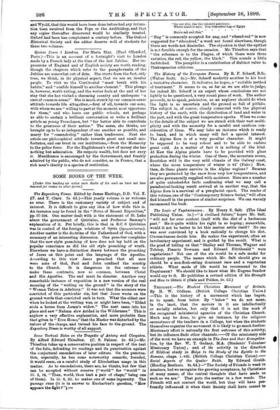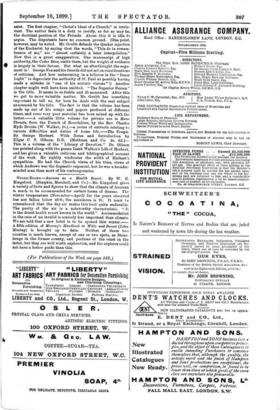Taxower.—The Student Christian Movement of Britain. By H. W. Oldham.
(British College Christian Union.) —This is the history of a movement which has begun, so to speak, from below. By " below " we do not mean, in the least, that the movers in it are intellectually or socially inferior, but only that it is not the work of the recognised ministerial agencies of the Christian Church. Much may be done, to give an instance, by the religious earnestness of the teachers in a College, but when the students themselves organise the movement it is likely to go much further. Missionary effort is naturally the first outcome of this activity, but its influence finds other channels.—Of the missionary side of the work we have an example in The Jews and their Evangelisa- tion, by the Rev. W. T. Gedney, M.A. (Students' Volunteer Missionary Union) ; and of its activity in the direction of Biblical study in Helps to the Study of the Epistle to the Romans, chaps. i.-viii. (British College Christian Union). Social Aspects of the Quaker Faith. By Edward Grubb. (Headley Brothers. 3s. 6d.)—" The Society of Friends is weak in numbers, but we recognise the growing acceptance, by Christians of many names, of the central thoughts that have made us such as we are." That puts the matter in a few words. The Friends will not convert the world, but they will have pro- foundly influenced it when their Society shal1.14ave ceased to exist. The first chapter, "Christ's Ideal of a Church," is irrele- vant. The author feels it a duty to justify, as far as may be, the doctrinal position of the Friends. About this it is idle to argue. The disputants have no common ground. (One point, however, may be noted. Mr. Grubb defends the Quaker rejection of the Eucharist by saying that the words, "This do in remem- brance of me," are " almost certainly a later interpolation." Now this is a great exaggeration. One manuscript of high authority, the Coder Bezte, omits them, but the weight of evidence is largely in their favour. But what an afterthought the argu- ment is ! George Fox and his friends did not act on considerations of criticism. And how unbecoming in a believer in the " Inner Light" to depreciate the authority of St. Paul as possibly having made a mistake in " one of his ecstatic visions " !) Another chapter might well have been omitted. "The Superior Person" is the title. It seems to us feeble and ill-mannered. After this we get to more valuable matter. Mr. Grubb has something important to tell us, for here he deals with the real subject announced by his title. The fact is that the volume has been made up out of his essays and papers produced at different times, and some very poor material has been mixed up with the better.—A valuable little volume for private use is Home Thrusts, from the French of Bourdalone, by the Rev. Charles Hyde Brooke (W. Walker, 2s.),—a series of extracts relating to various difficulties and duties of home life.—The Temple. By George Herbert. With Notes and Introduction by Edgar C. S. Gibson, D.D. (Methuen and Co. 2s. 63.)— This is a volume of the " Library of Devotion." Dr. Gibson has printed along with the poems Izaak Walton's Life of Herbert, and has given a valuable criticism and bibliographical account of the work. He rightly vindicates the width of Herbert's sympathies. He had the Church views of his time, views of which Andrews was the dogmatic exponent, but he was a broader- minded man than most of his contemporaries.



































 Previous page
Previous page